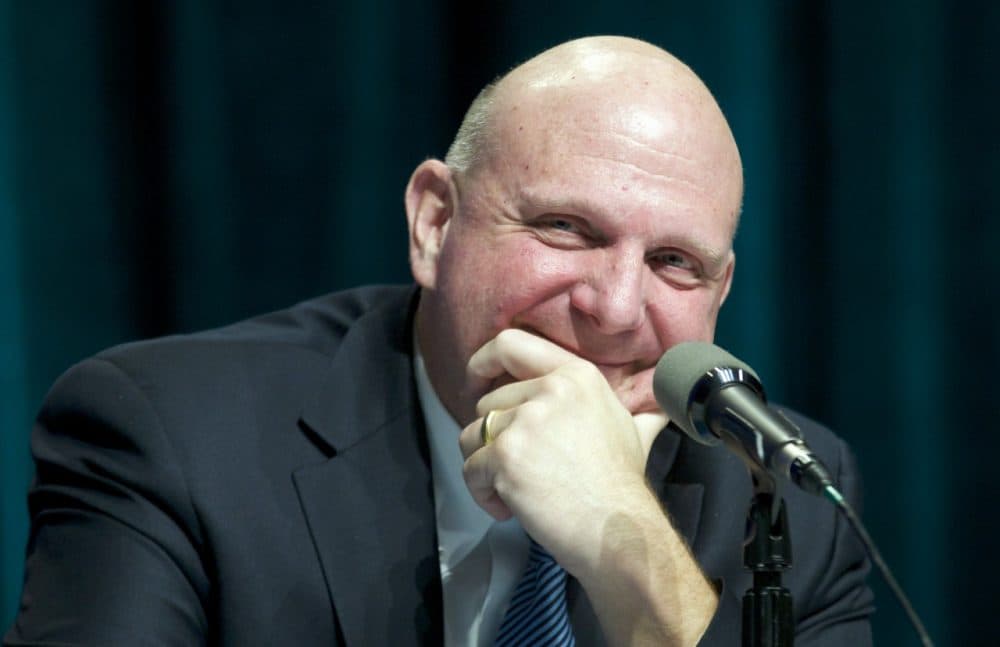Advertisement
S. Sterling Accepts $2 Billion For Clippers; D. Sterling Sues League

Late Friday afternoon, ESPN reported that Donald Sterling, the banned co-owner of the Los Angeles Clippers, had filed a $1-billion lawsuit charging the National Basketball Association with invasion of his constitutional rights and violation of the anti-trust laws, among other malfeasances.
Less than 24 hours earlier, former Microsoft Chief Executive Steve Ballmer signed an agreement to purchase the team from Sterling's wife for $2 billion. On Friday evening, the NBA approved the sale of the Clippers, and team co-owner Shelly Sterling and the family trust agreed not to sue the league and to absolve the NBA of litigation by Donald Sterling. After the NBA approved the sale, Mr. Sterling's attorney said, "We have to think throught he whole situation", suggesting that even Donald Sterling might be reluctant to sue himself, so Steve Ballmer will soon own the Clipper pending approval by league owners.
Steve Ballmer's offer was unprecedented. No NBA team has sold for more than $550 million, which is what the Milwaukee Bucks went for earlier this month. How current and potential lawsuits and countersuits will impact the sale is uncertain, as is the contention that Donald Sterling is incompetent and suffering from Alzheimer's disease. Sterling's attorney claims this is not the case.
Many questions remain, but on Friday I asked Forbes senior editor Kurt Badenhausen to help us put the sale into perspective by explaining why the Clippers attracted a $2-billion bid.
[sidebar title="The Dark Horse" width="630" align="right"] The Wall Street Journal’s Stu Woo joined Bill Littlefield to predict potential buyers back in early May. [/sidebar]
BL: When pro sports franchises are sold, it’s common for the wheeling and dealing to remain private until the deal is nearly done. But the Sterling saga has put the impending sale of the Clippers on the front page. How has that publicity affected the bidding?
KB: I think the only case you can really compare it to is what happened with the Los Angeles Dodgers when the Guggenheim group eventually paid $2 billion for the franchise. People thought maybe [the team] would go for $800 million, and the hype and excitement around the new TV deal that the Dodgers were going to get, and a premier market like L.A. just brought people out from the woodwork, and that's what we're seeing with the Clippers.
BL: So the publicity just increased the number of billionaires who might potentially own the team?
KB: I think so, and I think this really shows the value of a franchise in a premier market. The NBA has a lot of things going for it right now, a lot of global potential, much more so than the MLB and the NFL. And we haven't seen a team come up for sale in the L.A. market for more than 30 years, so if you're 60 years old and have $10 billion, this might be your only chance that you get to buy a franchise in the L.A. market.
BL: The more I listen to you, the more I think $2 billion makes sense.
KB: It's hard to make economic, rational sense of $2 billion though. I mean, this is 15 times revenue. The [Philadelphia] 76ers sold three years ago – the fourth-biggest market out there – they sold for 2 1/2 times revenue. It's hard to really make economic sense of what's going on with the Clippers.
[sidebar title="When It All Started" width="630" align="right"] Read Bill Littlefield's take on Donald Sterling's initial comments that eventually lead to the record sale.[/sidebar]
BL: The Clippers had a very good season and have two superstars in Blake Griffin and Chris Paul. The Los Angeles Lakers – on the other hand - had a terrible year. Does that play into the final price tag?
KB: Very good timing for the Clippers, absolutely. The Clippers are on the way up after three decades of futility, where they were a laughingstock. The one problem with the Clippers is that they act strictly as a tenant in the Staples Center. The Lakers get a much bigger share of premium seating and advertising. So, they're really limited in terms of how much they can earn, and they just re-signed their lease so they're locked in for the next 10 years, so that's not changing anytime soon.
BL: You're telling me that a man who still has $18 billion in the bank has to pay attention to a mere lease?
KB: Yeah, leases are ironclad, it's hard to get out of them. But you bring up a good point with Steve Ballmer; he's got $20 billion. So, you know, $2 billion is rolling around change in his pocket, he's not going to miss that. Treasury yields right now are 2.5 percent, so are you going to park your money there? Maybe you get no return on the Clippers. You still get to sit courtside, you still get to rub shoulders with global NBA stars. It's a very exclusive club, sports ownership.
This segment aired on May 31, 2014.